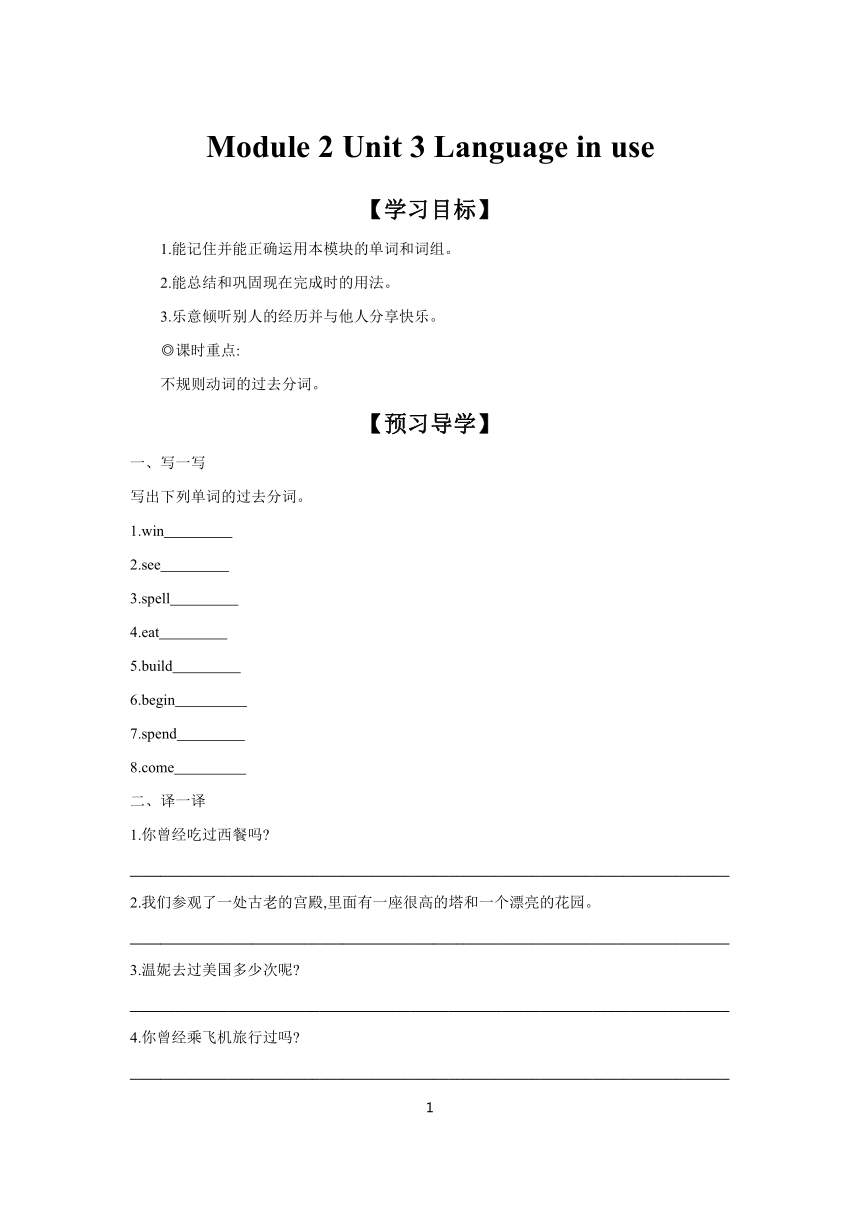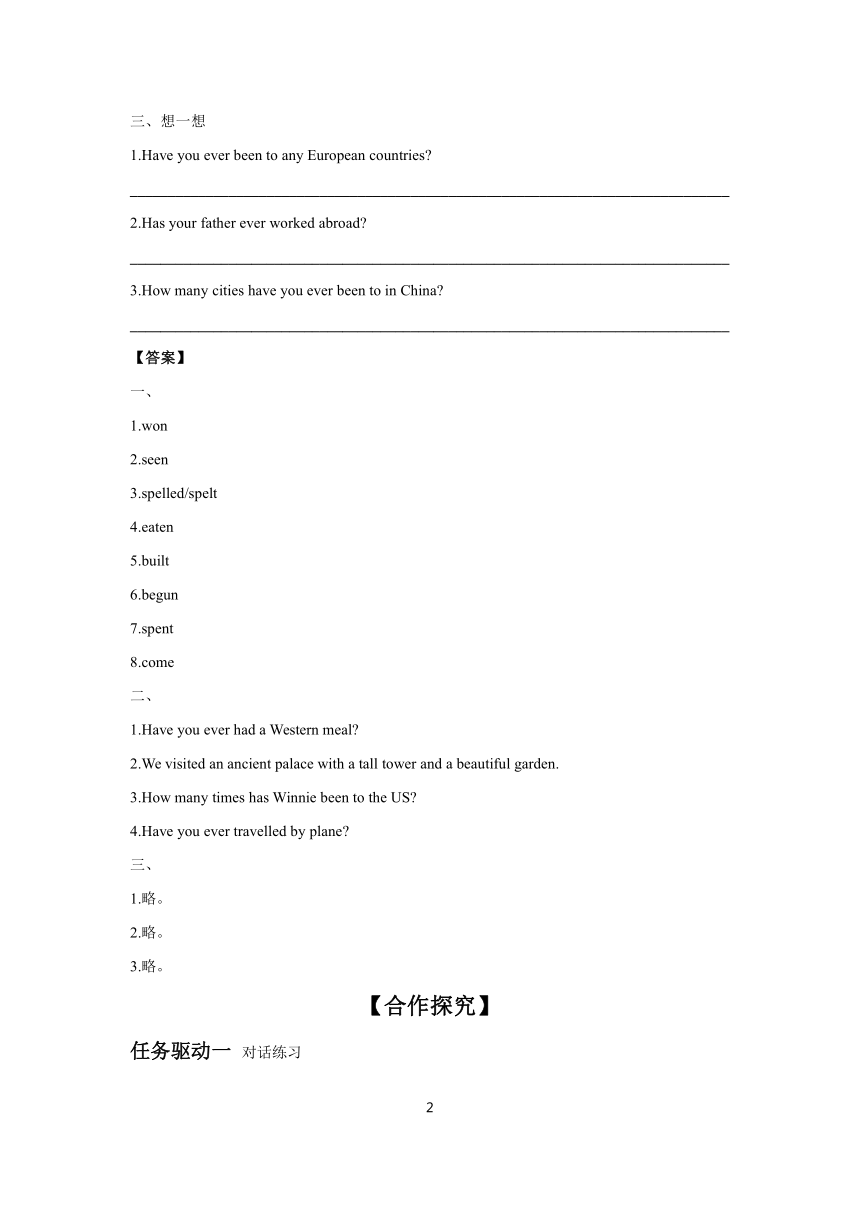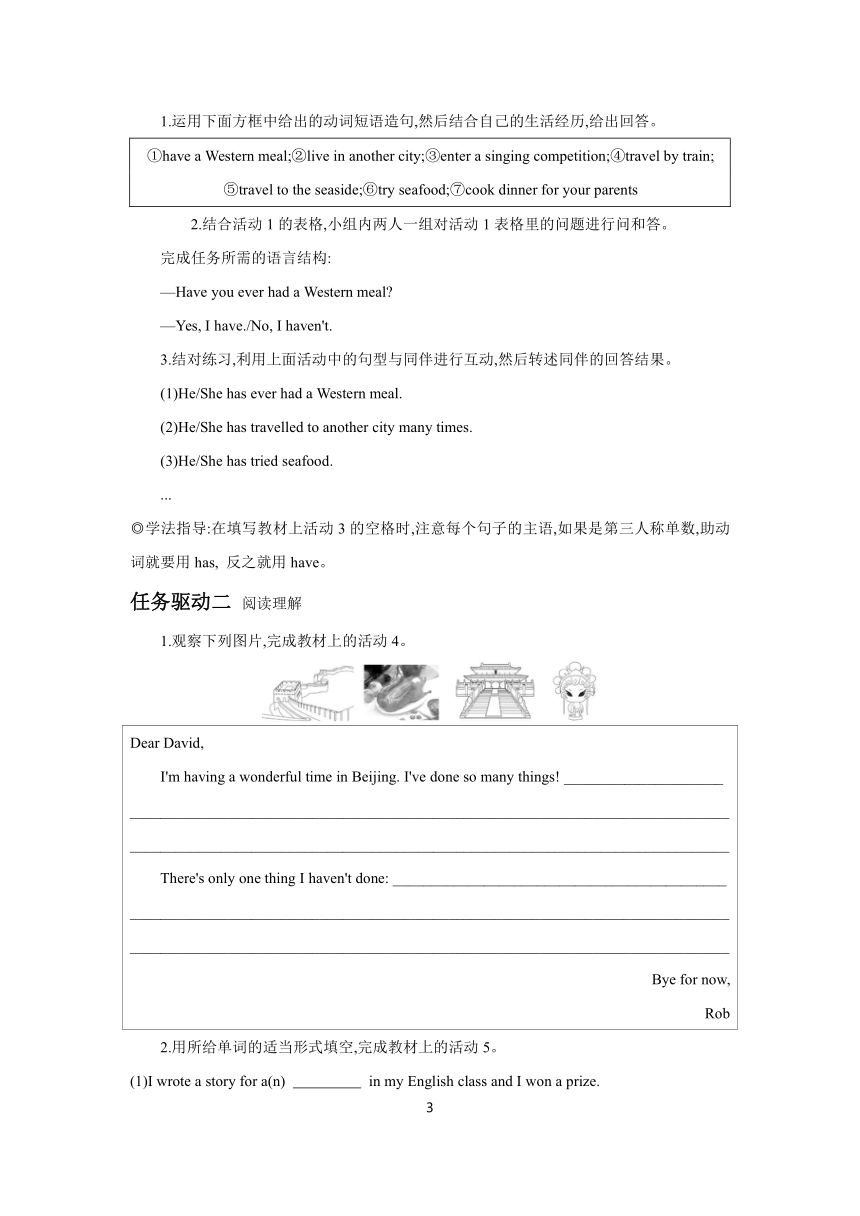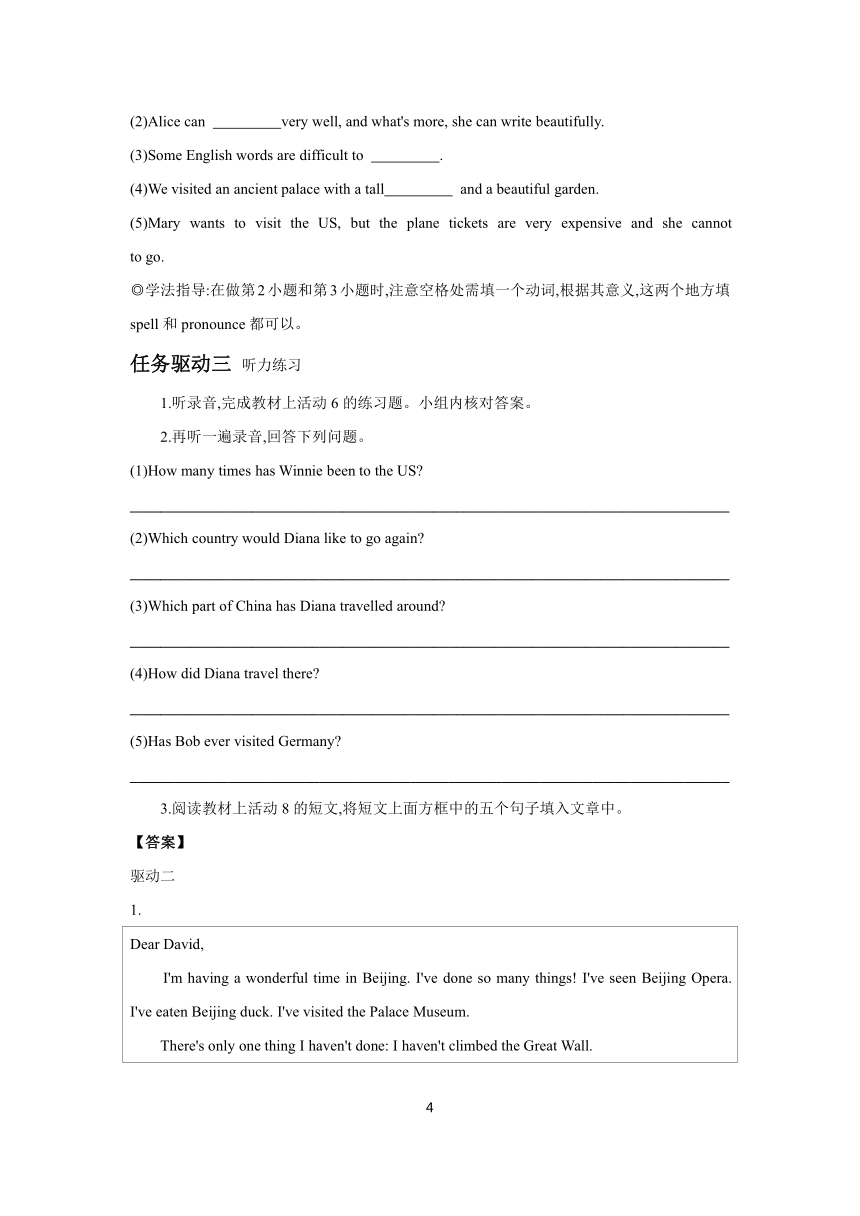Module 2 Unit 3 Language in use 学案(含答案) 2023-2024学年初中英语外研版八年级下册
文档属性
| 名称 | Module 2 Unit 3 Language in use 学案(含答案) 2023-2024学年初中英语外研版八年级下册 |

|
|
| 格式 | docx | ||
| 文件大小 | 44.8KB | ||
| 资源类型 | 教案 | ||
| 版本资源 | 外研版 | ||
| 科目 | 英语 | ||
| 更新时间 | 2024-02-27 00:00:00 | ||
图片预览




文档简介
Module 2 Unit 3 Language in use
【学习目标】
1.能记住并能正确运用本模块的单词和词组。
2.能总结和巩固现在完成时的用法。
3.乐意倾听别人的经历并与他人分享快乐。
◎课时重点:
不规则动词的过去分词。
【预习导学】
一、写一写
写出下列单词的过去分词。
1.win
2.see
3.spell
4.eat
5.build
6.begin
7.spend
8.come
二、译一译
1.你曾经吃过西餐吗
_______________________________________________________________________________
2.我们参观了一处古老的宫殿,里面有一座很高的塔和一个漂亮的花园。
_______________________________________________________________________________
3.温妮去过美国多少次呢
_______________________________________________________________________________
4.你曾经乘飞机旅行过吗
_______________________________________________________________________________
三、想一想
1.Have you ever been to any European countries
_______________________________________________________________________________
2.Has your father ever worked abroad
_______________________________________________________________________________
3.How many cities have you ever been to in China
_______________________________________________________________________________
【答案】
一、
1.won
2.seen
3.spelled/spelt
4.eaten
5.built
6.begun
7.spent
8.come
二、
1.Have you ever had a Western meal
2.We visited an ancient palace with a tall tower and a beautiful garden.
3.How many times has Winnie been to the US
4.Have you ever travelled by plane
三、
1.略。
2.略。
3.略。
【合作探究】
任务驱动一 对话练习
1.运用下面方框中给出的动词短语造句,然后结合自己的生活经历,给出回答。
①have a Western meal;②live in another city;③enter a singing competition;④travel by train; ⑤travel to the seaside;⑥try seafood;⑦cook dinner for your parents
2.结合活动1的表格,小组内两人一组对活动1表格里的问题进行问和答。
完成任务所需的语言结构:
—Have you ever had a Western meal
—Yes, I have./No, I haven't.
3.结对练习,利用上面活动中的句型与同伴进行互动,然后转述同伴的回答结果。
(1)He/She has ever had a Western meal.
(2)He/She has travelled to another city many times.
(3)He/She has tried seafood.
...
◎学法指导:在填写教材上活动3的空格时,注意每个句子的主语,如果是第三人称单数,助动词就要用has, 反之就用have。
任务驱动二 阅读理解
1.观察下列图片,完成教材上的活动4。
Dear David, I'm having a wonderful time in Beijing. I've done so many things! _____________________ ______________________________________________________________________________________________________________________________________________________________ There's only one thing I haven't done: ____________________________________________ _______________________________________________________________________________ _______________________________________________________________________________ Bye for now, Rob
2.用所给单词的适当形式填空,完成教材上的活动5。
(1)I wrote a story for a(n) in my English class and I won a prize.
(2)Alice can very well, and what's more, she can write beautifully.
(3)Some English words are difficult to .
(4)We visited an ancient palace with a tall and a beautiful garden.
(5)Mary wants to visit the US, but the plane tickets are very expensive and she cannot to go.
◎学法指导:在做第2小题和第3小题时,注意空格处需填一个动词,根据其意义,这两个地方填spell和pronounce都可以。
任务驱动三 听力练习
1.听录音,完成教材上活动6的练习题。小组内核对答案。
2.再听一遍录音,回答下列问题。
(1)How many times has Winnie been to the US
_______________________________________________________________________________
(2)Which country would Diana like to go again
_______________________________________________________________________________
(3)Which part of China has Diana travelled around
_______________________________________________________________________________
(4)How did Diana travel there
_______________________________________________________________________________
(5)Has Bob ever visited Germany
_______________________________________________________________________________
3.阅读教材上活动8的短文,将短文上面方框中的五个句子填入文章中。
【答案】
驱动二
1.
Dear David, I'm having a wonderful time in Beijing. I've done so many things! I've seen Beijing Opera. I've eaten Beijing duck. I've visited the Palace Museum. There's only one thing I haven't done: I haven't climbed the Great Wall. Bye for now, Rob
2.(1)competition
(2)pronounce/spell
(3)pronounce/spell
(4)tower
(5)afford
驱动三
2.(1)She has been to the US three times.
(2)She would like to go to China again.
(3)She has travelled around South China.
(4)She travelled there by train.
(5)Yes, he has.
【知识超市】
●live in another city住在另一个城市
another意为“又一个;另一个”,其后只能跟单数名词,指不确定的数目中的“另一个”。例如:
This T-shirt is too big for me. Could you please give me another one 这件T恤衫对我来说太大了。请你给我另一件好吗 (T恤衫不止两件)
【拓展】(1)当another作“再一;另外的”讲时,它后面可以跟few或基数词,可修饰复数名词。例如:
There's room for another few people in the back of the bus.这辆公共汽车的后面还能再容纳一些人。
Please bring me another ten chairs.请再给我带10把椅子来。
(2)the other指两者中的“另一个”,通常与one搭配使用,构成“one...the other...”,意为“一个……另一个……”。例如:
His parents both work in a hospital.One is a doctor, and the other is a nurse.他父母都在一家医院工作。一个是医生,一个是护士。
[做一做]单项选择。
( )1.This cake is delicious! Can I have piece, please
A.other
B.another
C.others
D.the other
( )2.Great changes have taken place in China. Who can tell it would be like in five years
A.how; other
B.what; more
C.how; another
D.what; another
现在完成时的用法
一、定义
现在完成时是指过去发生并且已经完成的动作对现在造成影响或后果,或指从过去某一时间开始的动作或状态一直持续到现在,并有可能持续下去。例如:
I have spent all of my money.我已经花完了所有的钱。(对现在造成的影响是“现在我没有钱花了”)
Michael has been ill.迈克尔一直病着。(动作一直持续,指“现在仍然是病着的”)
二、基本结构
主语+have/has+动词的过去分词(done)
(1)肯定句:主语+have/has+动词的过去分词+其他。例如:
He has eaten the apple.他已经吃了那个苹果。
(2)否定句:主语+have/has+not+动词的过去分词+其他。例如:
He hasn't eaten the apple.他没有吃那个苹果。
(3)一般疑问句:Have/Has+主语+动词的过去分词+其他 。例如:
—Has he eaten the apple 他吃了那个苹果吗
—Yes, he has./No, he hasn't.是的,他吃了。/不,他没吃。
(4)特殊疑问句:特殊疑问词或词组+一般疑问句(have/has+主语+过去分词+其他) 。例如:
What has he eaten 他吃了什么
三、规则动词的过去式和过去分词的变化规则
(1)一般动词,在词尾直接加-ed。例如:
work—worked—worked
visit—visited—visited
(2)以不发音字母“e”结尾的动词,只在词尾加-d。例如:
live—lived—lived
love—loved—loved
(3)以“辅音字母+y”结尾的动词,将y变为i,再加-ed。例如:
study—studied—studied
cry—cried—cried
(4)以重读闭音节结尾,且末尾只有一个辅音字母的动词,先双写该辅音字母,再加-ed。例如:
stop—stopped—stopped
drop—dropped—dropped
四、不规则动词的过去式和过去分词
be—was/were—been
find—found—found
do—did—done
have—had—had
eat—ate—eaten
make—made—made
go—went—gone
let—let—let
see—saw—seen
put—put—put
[做一做]单项选择。
( )1.Have you met Mr Li
A.just
B.ever
C.before
D.a moment ago
( )2.The famous writer one new book in the past two years.
A.is writing
B.was writing
C.wrote
D.has written
( )3.—Your shoes are so old. Why don't you buy a new one
—Because I my money on an MP5 player.
A.spend
B.have spent
C.am spending
D.was spending
对点自测
( )1.All the are from .
A.men doctors; Germany
B.men doctors; German
C.man doctors; Germany
D.man doctors; German
( )2.—Have you finished your work
—Yes, I have. I've finished it.
A.yet; already
B.already; yet
C.just; already
D.yet; not
( )3.Can you help me those exercise books I got a different number each time.
A.write B.count
C.move D.carry
( )4.—Is Tom at home
—No, he to the town.
A.has been
B.has gone
C.goes
D.will go
( )5.I the History Museum twice. I've learnt a lot there.
A.visit
B.am visiting
C.have visited
D.will visit
【答案】
[做一做]
1~2 BD
[做一做]
1~3 CDB
对点自测
1~5 AABBC
【学习反思】
_______________________________________________________________________________
_______________________________________________________________________________
_______________________________________________________________________________
2
【学习目标】
1.能记住并能正确运用本模块的单词和词组。
2.能总结和巩固现在完成时的用法。
3.乐意倾听别人的经历并与他人分享快乐。
◎课时重点:
不规则动词的过去分词。
【预习导学】
一、写一写
写出下列单词的过去分词。
1.win
2.see
3.spell
4.eat
5.build
6.begin
7.spend
8.come
二、译一译
1.你曾经吃过西餐吗
_______________________________________________________________________________
2.我们参观了一处古老的宫殿,里面有一座很高的塔和一个漂亮的花园。
_______________________________________________________________________________
3.温妮去过美国多少次呢
_______________________________________________________________________________
4.你曾经乘飞机旅行过吗
_______________________________________________________________________________
三、想一想
1.Have you ever been to any European countries
_______________________________________________________________________________
2.Has your father ever worked abroad
_______________________________________________________________________________
3.How many cities have you ever been to in China
_______________________________________________________________________________
【答案】
一、
1.won
2.seen
3.spelled/spelt
4.eaten
5.built
6.begun
7.spent
8.come
二、
1.Have you ever had a Western meal
2.We visited an ancient palace with a tall tower and a beautiful garden.
3.How many times has Winnie been to the US
4.Have you ever travelled by plane
三、
1.略。
2.略。
3.略。
【合作探究】
任务驱动一 对话练习
1.运用下面方框中给出的动词短语造句,然后结合自己的生活经历,给出回答。
①have a Western meal;②live in another city;③enter a singing competition;④travel by train; ⑤travel to the seaside;⑥try seafood;⑦cook dinner for your parents
2.结合活动1的表格,小组内两人一组对活动1表格里的问题进行问和答。
完成任务所需的语言结构:
—Have you ever had a Western meal
—Yes, I have./No, I haven't.
3.结对练习,利用上面活动中的句型与同伴进行互动,然后转述同伴的回答结果。
(1)He/She has ever had a Western meal.
(2)He/She has travelled to another city many times.
(3)He/She has tried seafood.
...
◎学法指导:在填写教材上活动3的空格时,注意每个句子的主语,如果是第三人称单数,助动词就要用has, 反之就用have。
任务驱动二 阅读理解
1.观察下列图片,完成教材上的活动4。
Dear David, I'm having a wonderful time in Beijing. I've done so many things! _____________________ ______________________________________________________________________________________________________________________________________________________________ There's only one thing I haven't done: ____________________________________________ _______________________________________________________________________________ _______________________________________________________________________________ Bye for now, Rob
2.用所给单词的适当形式填空,完成教材上的活动5。
(1)I wrote a story for a(n) in my English class and I won a prize.
(2)Alice can very well, and what's more, she can write beautifully.
(3)Some English words are difficult to .
(4)We visited an ancient palace with a tall and a beautiful garden.
(5)Mary wants to visit the US, but the plane tickets are very expensive and she cannot to go.
◎学法指导:在做第2小题和第3小题时,注意空格处需填一个动词,根据其意义,这两个地方填spell和pronounce都可以。
任务驱动三 听力练习
1.听录音,完成教材上活动6的练习题。小组内核对答案。
2.再听一遍录音,回答下列问题。
(1)How many times has Winnie been to the US
_______________________________________________________________________________
(2)Which country would Diana like to go again
_______________________________________________________________________________
(3)Which part of China has Diana travelled around
_______________________________________________________________________________
(4)How did Diana travel there
_______________________________________________________________________________
(5)Has Bob ever visited Germany
_______________________________________________________________________________
3.阅读教材上活动8的短文,将短文上面方框中的五个句子填入文章中。
【答案】
驱动二
1.
Dear David, I'm having a wonderful time in Beijing. I've done so many things! I've seen Beijing Opera. I've eaten Beijing duck. I've visited the Palace Museum. There's only one thing I haven't done: I haven't climbed the Great Wall. Bye for now, Rob
2.(1)competition
(2)pronounce/spell
(3)pronounce/spell
(4)tower
(5)afford
驱动三
2.(1)She has been to the US three times.
(2)She would like to go to China again.
(3)She has travelled around South China.
(4)She travelled there by train.
(5)Yes, he has.
【知识超市】
●live in another city住在另一个城市
another意为“又一个;另一个”,其后只能跟单数名词,指不确定的数目中的“另一个”。例如:
This T-shirt is too big for me. Could you please give me another one 这件T恤衫对我来说太大了。请你给我另一件好吗 (T恤衫不止两件)
【拓展】(1)当another作“再一;另外的”讲时,它后面可以跟few或基数词,可修饰复数名词。例如:
There's room for another few people in the back of the bus.这辆公共汽车的后面还能再容纳一些人。
Please bring me another ten chairs.请再给我带10把椅子来。
(2)the other指两者中的“另一个”,通常与one搭配使用,构成“one...the other...”,意为“一个……另一个……”。例如:
His parents both work in a hospital.One is a doctor, and the other is a nurse.他父母都在一家医院工作。一个是医生,一个是护士。
[做一做]单项选择。
( )1.This cake is delicious! Can I have piece, please
A.other
B.another
C.others
D.the other
( )2.Great changes have taken place in China. Who can tell it would be like in five years
A.how; other
B.what; more
C.how; another
D.what; another
现在完成时的用法
一、定义
现在完成时是指过去发生并且已经完成的动作对现在造成影响或后果,或指从过去某一时间开始的动作或状态一直持续到现在,并有可能持续下去。例如:
I have spent all of my money.我已经花完了所有的钱。(对现在造成的影响是“现在我没有钱花了”)
Michael has been ill.迈克尔一直病着。(动作一直持续,指“现在仍然是病着的”)
二、基本结构
主语+have/has+动词的过去分词(done)
(1)肯定句:主语+have/has+动词的过去分词+其他。例如:
He has eaten the apple.他已经吃了那个苹果。
(2)否定句:主语+have/has+not+动词的过去分词+其他。例如:
He hasn't eaten the apple.他没有吃那个苹果。
(3)一般疑问句:Have/Has+主语+动词的过去分词+其他 。例如:
—Has he eaten the apple 他吃了那个苹果吗
—Yes, he has./No, he hasn't.是的,他吃了。/不,他没吃。
(4)特殊疑问句:特殊疑问词或词组+一般疑问句(have/has+主语+过去分词+其他) 。例如:
What has he eaten 他吃了什么
三、规则动词的过去式和过去分词的变化规则
(1)一般动词,在词尾直接加-ed。例如:
work—worked—worked
visit—visited—visited
(2)以不发音字母“e”结尾的动词,只在词尾加-d。例如:
live—lived—lived
love—loved—loved
(3)以“辅音字母+y”结尾的动词,将y变为i,再加-ed。例如:
study—studied—studied
cry—cried—cried
(4)以重读闭音节结尾,且末尾只有一个辅音字母的动词,先双写该辅音字母,再加-ed。例如:
stop—stopped—stopped
drop—dropped—dropped
四、不规则动词的过去式和过去分词
be—was/were—been
find—found—found
do—did—done
have—had—had
eat—ate—eaten
make—made—made
go—went—gone
let—let—let
see—saw—seen
put—put—put
[做一做]单项选择。
( )1.Have you met Mr Li
A.just
B.ever
C.before
D.a moment ago
( )2.The famous writer one new book in the past two years.
A.is writing
B.was writing
C.wrote
D.has written
( )3.—Your shoes are so old. Why don't you buy a new one
—Because I my money on an MP5 player.
A.spend
B.have spent
C.am spending
D.was spending
对点自测
( )1.All the are from .
A.men doctors; Germany
B.men doctors; German
C.man doctors; Germany
D.man doctors; German
( )2.—Have you finished your work
—Yes, I have. I've finished it.
A.yet; already
B.already; yet
C.just; already
D.yet; not
( )3.Can you help me those exercise books I got a different number each time.
A.write B.count
C.move D.carry
( )4.—Is Tom at home
—No, he to the town.
A.has been
B.has gone
C.goes
D.will go
( )5.I the History Museum twice. I've learnt a lot there.
A.visit
B.am visiting
C.have visited
D.will visit
【答案】
[做一做]
1~2 BD
[做一做]
1~3 CDB
对点自测
1~5 AABBC
【学习反思】
_______________________________________________________________________________
_______________________________________________________________________________
_______________________________________________________________________________
2
同课章节目录
- Module 1 Feelings and impressions
- Unit 1 It smells delicious.
- Unit 2 I feel nervous when I speak Chinese .
- Unit 3 Language in use
- Module 2 Experiences
- Unit 1 I've also entered lots of speaking competi
- Unit 2 They have seen the Pyramids.
- Unit 3 Language in use
- Module 3 Journey to space
- Unit 1 Has it arrived yet?
- Unit 2 We have not found life on any other planet
- Unit 3 Language in use
- Module 4 Seeing the docto
- Unit 1 I haven't done much exercise since I got m
- Unit 2 We have played football for a year now
- Unit 3 Language in use
- Module 5 Cartoons
- Unit 1 It's time to watch a cartoon.
- Unit 2 Tintin has been popular for over eighty yea
- Unit 3 Language in use
- Revision module A
- Module 6 Hobbies
- Unit 1 Do you collect anything ?
- Unit 2 Hobbies can make you grow as a person.
- Unit 3 Language in use
- Module 7 Summer in Los Angeles
- Unit 1 Please write to me and send me some photos
- Unit 2 Fill out a form and come to learn English
- Unit 3 Language in use
- Module 8 Time off
- Unit 1 I can hardly believe we are in the city ce
- Unit 2 We thought somebody was moving about
- Unit 3 Language in use
- Module 9 Friendship
- Unit 1 Could I ask if you've mentioned this to he
- Unit 2 I believe that the world is what you think
- Unit 3 Language in use
- Module 10 On the radio
- Unit 1 I hope that you can join us one day
- Unit 2 It seemed that they were speaking to me in
- Unit 3 Language in use
- Revision module B
